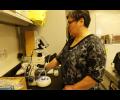
CBC
Should parents have the choice to keep their child in the same grade after 2nd disrupted school year?
After a pandemic year of switching between in-person and remote learning, Nicholas Madott isn’t ready to move from kindergarten to Grade 1 this fall, according to his parents. Currently on his second stint of learning at home since January, the Collingwood, Ont., student spends about 30 minutes online with his teacher and classmates daily. The rest of the time is for offline learning guided by his parents. This year has been “sub-optimal in terms of his ability to read and recognize his sight words and to develop,” Carita Valentini said of her five-year-old, the youngest in his grade due to his late-December birthday. She and her husband, Paul Madott, requested for Nicholas to continue in kindergarten this fall, but have yet to convince school officials it’s the right move. From parents and teachers to child development specialists and education researchers, many have expressed concern about the disrupted education of Canadian students amid the COVID-19 pandemic. Now, some are suggesting educators reconsider an option that has been largely abandoned: Having some students repeat a grade. ‘They’re getting half an education,’ consultant says The reluctance around repeating a grade isn’t entirely new to the couple: they encountered it with their seven-year-old daughter Victoria — also born in late December — before the family moved to their current home. At Victoria’s previous school, “they were at least open to the dialogue and the assessment of Victoria as an individual. This time around, we were just met with, ‘Well, we don’t do that at this board,'” Valentini said. Paul Madott and Carita Valentini are seen with their children Victoria, 7, and Nicholas, 5, in Collingwood, Ont. After a pandemic-disrupted school year that was ‘sub-optimal’ for Nicholas’s learning, Madott and Valentini requested he continue in kindergarten in the fall. School officials turned them down.(Keith Whelan/CBC) Monika Ferenczy, an Ottawa-based education consultant who is helping Valentini and Madott with their request for Nicholas, said she’s heard from many parents during the pandemic who are worried that the school system is not meeting their children’s needs and that students are being left behind. “They’re getting half an education … definitely not the same quality of experience, of learning, that especially young children need … particularly from preschool to grades 1, 2 and 3, which are the critical years for establishing a good relationship and mindset with school,” she said. “If we have a young child who doesn’t like going to school in junior kindergarten or senior kindergarten, they’re already at risk.” WATCH | ‘Shouldn’t be a taboo subject’ to give a student more time to learn, says consultant: In response to the pandemic, many school divisions and boards have had to enact a host of changes in a relatively short period, she explained, including consulting families about virtual school, marshalling tech devices and internet service for students without them, and, in some cases, completely shifting how education is delivered. There will be ripple effects from these changes, so families should be consulted on how students will progress, Ferenczy said. “Just like they were asked whether their child is returning to in-person or virtual learning for next year, it should be part of the same type of choice and conversation,” she said. “‘Would you like your child to continue in the same grade for some additional learning time with the Grade 2 or Grade 3 curriculum, or would you like them to move on to the next grade?’ It’s a very easy question.” Parents always able to flag concerns, ‘pandemic or not’ A range of student achievement has always existed within a class or grade, so the strategy is to “meet every student where they’re at and move them forward,” said Laurie French, president of the Canadian School Boards Association, a national body representing school boards across the country. Laurie French, president of the Canadian School Boards Association and a school trustee in Ontario, says while some students have thrived during the pandemic, others have struggled, and a strategy will be needed to close the gap.(Submitted by Laurie French) “Any parents who have concerns with their student’s achievement are always able to talk to the teachers and the system … in a pandemic or not.” Some students have thrived during the pandemic, French said, so she doesn’t see the logic of having whole classes or cohorts repeat their year. However, she recognizes that post-pandemic education recovery efforts must acknowledge that for other students, the learning gap has widened and be clear about the investments needed to address it, she said. “We need to rely on evidence. We need to rely on our educators to tell us and start to build strategies. This is going to take us a long time to truly understand what the impacts are,” said French, who is based in Kingston, Ont., and also serves as a school trustee for the Limestone District School Board representing Greater Napanee. Not ideal, but possibly ‘least-worst option’ In Canada, education is a linear system with age-based cohorts: what’s learned in each grade is linked to what comes next. In this kind of system, if a student is separated from his or her cohort, there can be negative effects tied to social development, stigmatization and learning, said Prachi Srivastava, an associate professor in education and global development at Western University in London, Ont. Over the years, the practice has been to provide targeted support to all children who require additional measures, she said, whether it’s a student with learning challenges or one who learns faster than the group. The ideal education recovery scenario would include broad-based curriculum reform, remedial education from K-12 to boost core skills and targeted interventions and support for students severely affected by COVID-19, says Prachi Srivastava, an associate professor of education and global development at Western University in London, Ont. In the absence of this approach, she says, students repeating a grade could be ‘the least-worst option.’ (NEO Image Creations/Western University) “Simply repeating a grade without having the targeted interventions and the support that are required is not enough to make sure that child or that student is able to master the curriculum and the skills that they need,” said Srivastava. That said, pandemic times are not normal times. Srivastava said the Canadian system must undertake multiple measures to address the disrupted learning Canadian students have faced since March 2020. The ideal scenario, she said, would be for provincial ministries of education to conduct broad-based curriculum reform, implement remedial education for all students from K-12 to boost core skills and encourage the development of others — such as coping skills and mental health awareness — for times of crisis or emergency. She’s also calling for targeted interventions and tutorial support for households, schools and communities severely affected by COVID-19. WATCH | What’s needed to address pandemic-disrupted schooling? Srivastava said this kind of high-level education recovery plan should come with the collection of comparable data, widespread collaboration and adequate funding. And it should be in place for the next two school years at minimum, she said. If education funding doesn’t get a boost and crucial curricular reforms aren’t introduced, the system may have to consider whether having groups of students repeat a grade is “the least-worst option,” she said. “The education and socioeconomic consequences [of COVID-19] don’t end when everybody is vaccinated or when a good proportion of the population is vaccinated…. Those consequences outlive that and that’s what we need to be planning for.”








